In one of my university social work class there was an intense argument about nature versus nurture – Is empathy innate or learned? As I recall, I took the innate side of the argument then but I’ve since changed my tune. I believe that empathy can and should be taught starting at a young age.
The Oxford Dictionary defines empathy as, “the ability to understand and share the feelings of another,” and Wikipedia notes, “One may need to have a certain amount of empathy before being able to experience compassion.” I think of empathy as the ability to recognize how another person feels and compassion as the drive help them feel better. Both empathy and compassion have been important parts of my life and I feel that they are two of the most crucial interpersonal skills I can pass on to my children.
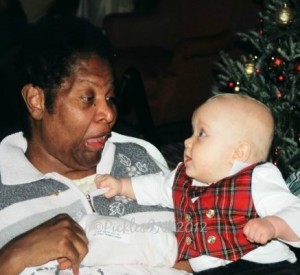
Ben and Carol grin at each other. Carol was my nanny when I was young. She was disabled by a brain aneurysm and is mostly non-verbal, but she can still make her feelings known!
I have a lovely friend who is a much more of an attachment-parenting, Dr. Sears-reading type than I am, and I remember on one of our earliest playdates thinking, “Wow, she’s got it so together – she talks to her kids about their feelings when they misbehave and never raises her voice with them!” As it turns out, at this same time, she was looking at me and thinking, “Wow, she’s got it so together! She doesn’t mess around when her kids misbehave and they listen to her when she uses her ‘mommy’ voice!”
One of the things I learned from this friend and incorporated into my own parenting style was the use of the word “kind” when I praise my kids. There is an awful lot out there about the pros and cons of praising your children (read for yourself: I just Googled “pros and cons of praising children” and it’s like a table-tennis match – “Praise your children!” “Don’t praise your children!” “Dos and don’ts of praising your children” “Are we setting our children up to fail?” etc.). I disagree with the extremes on either side (perhaps the parents who chant, “WOW GOOD JOB!!” 18,000 times a day and the people who read and write articles accusing those good-jobbers of manipulating their children and creating “praise junkies” should be locked in a giant arena to fight it out so the rest of us can get on with life).
The middle ground is:
- Yes, we do use praise to “manipulate” our kids. It is one of the tools that we have to teach our kids to act appropriately and be productive members of society.
- True, too much empty praise sets kids up for disappointment (“But mommy, you told me I was a great hockey player and I DIDN’T EVEN SCORE A SINGLE GOAL!!”).
- Praise is the most effective when it is specific and descriptive (but sometimes we parents are busy and distracted and the odd, “Good job!” never hurt anyone).
I was thinking about how I use the word “kind” and I realized that the reason it appeals to me is that it fits that third criterion as it is much more specific and descriptive than the usual “nice.” “Nice” is something you just happen to be whereas “kind” describes a choice that you have made to make another person feel good. When I use it I usually pair it with a description of the other person’s emotions – “It was so kind of you to share your cookie with Molly, Ben. Look how happy that made her!” or conversely, “Oh dear, Molly – that was not very kind. Look how sad Ben is because you snatched his toy.”
A tool that I use (that this friend admits borrowing from me in return!) is that when someone has been hurt, I ask Ben and Molly to apologize and then to ask the injured party, “Are you okay?” and if the answer is “No,” to ask, “What can I do to help?”
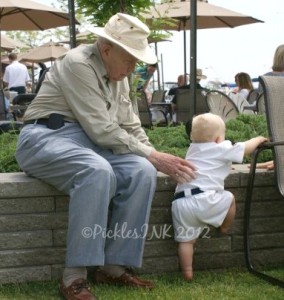
Papa (age 95) give baby Ben a helping hand.
There is a lovely program called Seeds of Empathy that has been in place at Ben and Molly’s school for many years (you may also have heard of its older sibling, Roots of Empathy, which works with school-aged children). These programs introduce a baby to a classroom as a “Teacher” to foster empathy and compassion in the children over the course of the program year. A trained “Family Guide” helps the children to observe the baby’s development and label his or her feelings.
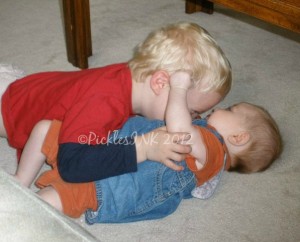
Ben and Molly hugs – of course, they don’t get to manhandle the Seeds of Empathy babies like this!
I’ve been thinking about this lately as the winds are starting to pick up around the new Ontario sex education curriculum. Short back story: The Ontario elementary school sex ed curriculum hasn’t been updated since 1997. Let me repeat that so it can sink in. NINETEEN NINETY SEVEN. Children are learning from the same sex ed curriculum as their parents did, even though the world they live in is light-years away from the world that curriculum was written for. The dog-eared Playboy under the mattress has turned into unlimited porn on a smartphones. MASH notes have become sexts. And a nasty note inscribed on a bathroom wall is now a tweet with the potential to reach millions.
Almost 20 years old. When this curriculum was written, discussion of LGBT issues consisted of snickers about the manly female field hockey coach or that uncomfortable way mom talks about Uncle Dave and his umm-friend Ray. This curriculum is OLDER THAN MARRIAGE EQUALITY. Good gracious.
But I digress.
Anyway, the provincial government tried to introduce a new curriculum in 2010 but backed down under public pressure; now they’re trying again and I really, really hope they are able to get the jump on the opposition and paint a more accurate picture of the curriculum before snippets are skillfully presented out of context like last time.
One of the items that has already been getting a lot of press is the idea of teaching the concept of consent to first-graders. People are already jumping on this with, “SIX IS WAY TOO YOUNG TO LEARN ABOUT SEX AND RAPE!!!” Now, my own thoughts on the “too young” issue aside, the idea is not to teach about “sex and rape” anyway; rather the teaching would be about reading verbal and non-verbal cues to how someone is feeling and respecting those feelings and acting appropriately. Sowing, one might say, the seeds of empathy…and teaching kids to act with compassion in every situation.
See? You knew it was going to circle back to compassion eventually!
So that’s the crux of the issue – sex ed, empathy, enthusiastic consent, compassion…it all comes down to reading cues, recognizing feelings, and respecting them. Do unto others, right?
If we teach our kids a) to interpret cues correctly to guess how someone is feeling; and b) to want other people to feel good; the end result will be c) kids will make choices that result in other people feeling good and not to make choices that make them feel bad. As a child, that might mean helping a friend rebuild a tower they knocked over. As an adult, that might mean saying to a sexual partner, “Are you okay? Do you want to stop?”
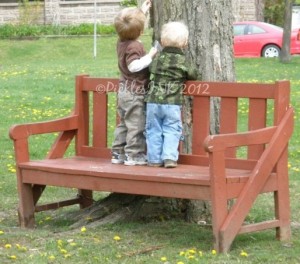
Boys will be boys…compassionate, caring, and empathetic.
A couple of years ago, Ben shared one of those everyday 5 year-old boy heartaches that makes my inner mama-bear rear up on her hind legs and start pawing the air the: “Mommy, Daniel* called me a baby. He said that Diego is a baby show and I shouldn’t watch it because that makes me a baby…and that made me feel little and I don’t like feeling little.” He paused for a few seconds and then added, “But then Joey whispered in my ear, ‘I think you’re really big.'”
This mama bear wants to find Joey, his parents, and the Seeds of Empathy creators, buy them several bottles of wine, and dole out hugs all around, because empathy and compassion are clearly thriving in that classroom!
The outcome of all this so far is that although their impulse control (or lack thereof) frequently gets the better of them, if either Ben or Molly does something that upsets the other they’re often comforting each other before I have a chance to say, “What happened, guys?” – which in turn makes me feel pretty good!
~ karyn
* Names have been changed.
Join the #1000Speak movement! On February 20, 2015, flood the internet with GOOD – Write, share, post, or pin about compassion, kindness, support, caring for others, non-judgement, care for the environment etc, and use the hashtag #1000Speak.
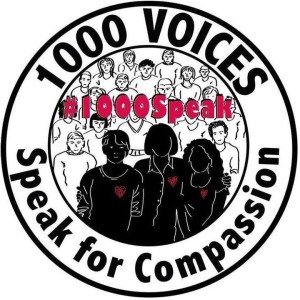
Isn’t it funny how, as mothers, we always think somebody else has it all together and we don’t?! I am the same way! And then a friend will compliment me on my parenting and make me see me through their eyes. This is a great piece on compassion. And empathy! Both are so very important. And I agree that both are things that need to be taught to our children. Not with our words, but with our actions. Because, after all, didn’t our mothers teach us, that ACTIONS SPEAK LOUDER THAN WORDS?
#1000Speak
Love this, Karyn! Its hard, but teaching kids empathy is so important. Great ideas here.
Love this. I have been wondering about the new curriculum for sex ed in Ontario. My niece has just started school and I’ve been wondering how this will be taught. Excellent 1000Speak post.
I like your take on the idea of compassion. 20 years? Wow, that is pretty incredible.